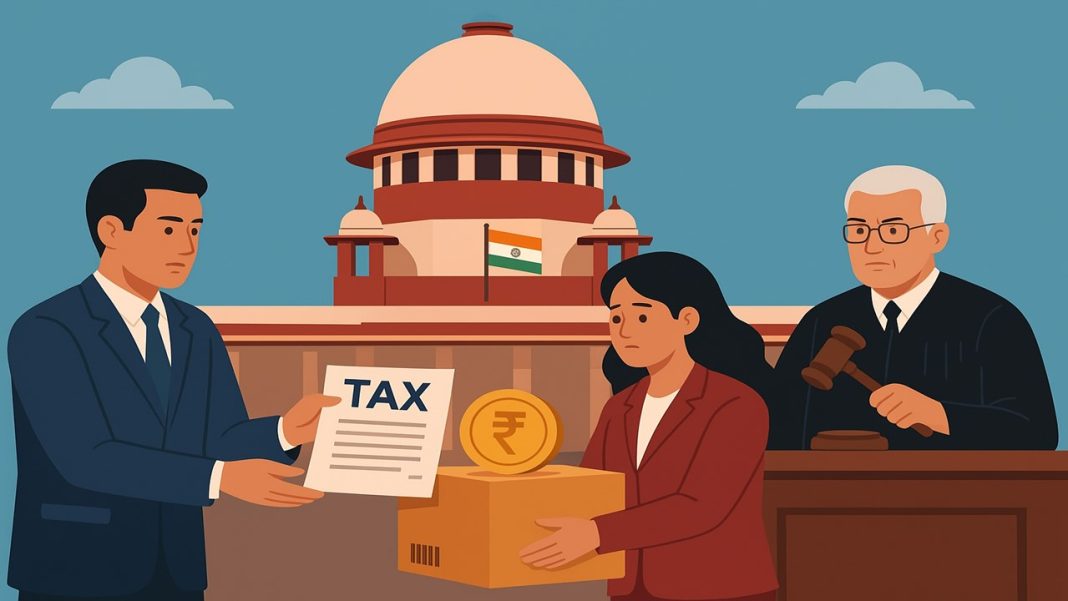Supreme Court Upholds ITC Benefit for Bona Fide Purchasers Under DVAT
The Supreme Court, in a recent ruling, has ruled that if a business buys goods from another business that is properly registered, and the buyer pays the VAT shown in the invoice, then in that case the buyer should not be punished for the mistake of the seller. Meaning, the buyer should not be punished if the seller fails to deposit that VAT with the government. Instead, the tax department should recover the VAT amount from the seller and not deny the buyer’s Input Tax Credit (ITC).
Therefore, the Supreme Court had dismissed the government’s appeal and allowed the Delhi High Court’s decision in favour of the appellant, i.e., M/s Shanti Kiran India Private Limited.
The present appeal (Civil Appeal Nos. 2042–2047/2015, along with Civil Appeal No. 9902 of 2017) has been filed by the Commissioner of Trade and Tax of Delhi (Appellant) in the Supreme Court of India against a company named M/S Shanti Kiran India (P) Limited. The benches comprised Honourable Justice Manoj Misra and Justice Nongmeikapam Kotiswar Singh. This has come to the Supreme Court following the decision in the Delhi High Court. The main issue was about the Input Tax Credit (ITC) under the Delhi Value Added Tax (DVAT) Act, 2004.
The question raised in the court was, “Can a registered buyer (purchasing dealer) claim ITC if the seller from whom he bought goods collected VAT but did not deposit that tax with the government?”
So what happened in the case was that the buyers had already paid the tax amount to the sellers through invoices, but later, those sellers did not deposit that tax to the government, and their registrations were cancelled.
When the case was first taken to the Delhi High Court, the court decided that the purchasing dealers had acted in good faith. They bought goods from registered sellers at the time of purchase. They paid VAT to those sellers through proper invoices. Hence, the High Court rules that these buyers should not lose their Input Tax Credit (ITC) benefit just for a minor reason that sellers later failed to pay tax to the government. Hence, after properly checking the invoices, the High Court allowed them to claim ITC.
Delhi High Court’s View:
In order to understand this case, the court reviewed Section 9 of the DVAT Act, 2004. In which Section 9(1) allows a registered dealer to claim ITC for purchases made in the course of business that are taxable, Section 9(2) lists conditions when ITC is not allowed, and Clause (g) of Section 9(2) says ITC can be claimed only if the tax paid by the buyer has actually been deposited by the seller with the government.
This clause had created confusion because it meant that even if the buyer acted honestly, they could lose ITC just because the seller did not deposit the tax. In order to announce its decision, the court also cited an earlier case relating to the issue titled Quest Merchandising India Pvt. Ltd vs. Govt. of NCT of Delhi (2017). In this case, the Court had ruled that if the purchasing dealer has honestly bought goods from a registered seller, paid VAT through proper invoices, and there’s no mismatch in their tax returns (Annexure 2A and 2B), then ITC cannot be denied to the purchaser. The buyer should not be punished for the mistake of the seller. However, if evidence shows both buyer and seller acted in collusion, then the department can act against both under Section 40A of the DVAT Act.
Supreme Court’s View
The decision taken by the Delhi High Court in Quest Merchandising’s case had already been challenged before the Supreme Court in SLP (Civil) No. 36750 of 2017, but the Supreme Court had dismissed that petition, meaning it did not overturn the Delhi High Court’s view.
Now, in the Shanti Kiran India (P) Ltd. case, the Supreme Court followed the same principle.
It was observed that the seller-dealers were registered at the time of the transactions. The invoices and transactions were genuine and not doubted by the department. Therefore, the purchasing dealers acted bona fide. So, there was no reason to interfere with the Delhi High Court’s order that allowed ITC to the purchasers.
Final Supreme Court Order
In the final decision, the Supreme Court ruled that the Delhi High Court was right in granting ITC to the purchasers. The appeals filed by the Department (Commissioner of Trade and Taxes, Delhi) had no merit. Hence, the appeals were dismissed.
Citation: Commissioner of Trade and Tax of Delhi Vs M/S Shanti Kiran India (P) Limited (Supreme Court); Civil Appeal Nos. 2042-2047/2015; 09/10/2025



